Business
Governments must work to improve Canadian living standards despite recent good news

From the Fraser Institute
By Jake Fuss and Grady Munro
For years, Canadians have experienced a decline in living standards. According to new data from Statistics Canada, living standards may finally be headed back in the right direction, but there’s still much work to be done.
The new numbers show that inflation-adjusted gross domestic product (GDP)—the final value of all goods and services produced in the economy—grew by 0.5 per cent during the first three months of 2025. During that same period, population growth slowed considerably to just 0.2 per cent. For perspective, the average quarterly population growth last year was three times this rate at 0.6 per cent. As a result, inflation-adjusted per-person GDP—a broad measure of individual living standards—grew by 0.4 per cent to reach $59,146 at the end of March 2025.
This is a good sign as it marks the first time living standards have improved for two consecutive quarters (per-person GDP grew 0.1 per cent to end 2024) since the first half of 2022, but we must temper our optimism. Economic growth remains relatively weak compared to historical numbers. And a per-person GDP of $59,146 is still 2.6 per cent below the mid-2022 level ($60,718). For comparison, per-person GDP in the United States after the first three months of 2025 is 4.9 per cent higher than in mid-2022.
Simply put, Canadian living standards remain well below levels they’ve been in past years and growth has fallen well behind growth south of the border, meaning governments across Canada must take steps to promote economic growth.
Recently, there has been a push in Canada to eliminate interprovincial trade barriers, which inhibit the free flow of goods and services between provinces and act as a drag on the economy. Several provinces have already taken steps towards this end, and the federal government has committed to eliminate all federally-imposed trade barriers by Canada Day. These efforts are long overdue, and should be joined by all governments across the country.
Governments should also get their finances in order and finally stop adding to the mountain of debt. In 2025/26, nine out of 10 provinces (except Saskatchewan) and the federal government plan to run budget deficits—meaning they will spend more money than they collect in revenues and thus must borrow additional funds. Consequently, government debt will continue to rise.
Rising government debt acts as a drag on the economy. Indeed, research suggests that when combined federal and provincial government debt exceeds the entire size of the economy (as it did in seven out of 10 provinces in 2022) additional debt offers little benefit to economic growth, and instead inhibits growth in the economy. As such, governments across the country must lower spending to balance their budgets and chip away at this mountain of debt.
Finally, governments should also pursue comprehensive tax reforms to lower the tax burden and make Canada more attractive to professionals, businessowners and entrepreneurs, while also improving the economic incentives to work, save and invest. Without meaningful reform, Canada’s tax system will continue to inhibit economic growth and, consequently, living standards.
New economic data suggest that Canadian living standards have improved in recent months, but we must temper our optimism. Governments across the country should pursue meaningful policy reforms to help grow the economy and improve prosperity.
Business
SpaceX to record $15.5B in 2025 revenue, surpassing NASA’s budget
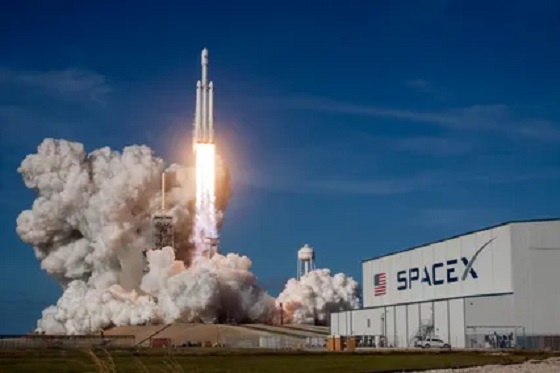
 MxM News
MxM News
Quick Hit:
SpaceX, under the leadership of billionaire Elon Musk, is expected to generate $15.5 billion in revenue this year, a landmark figure that reflects the private aerospace firm’s unmatched ascent in the commercial space industry. That revenue estimate eclipses NASA’s projected 2026 commercial space budget of $1.1 billion, emphasizing SpaceX’s increasing dominance over government-funded initiatives. The company’s growth is powered in large part by its satellite internet arm, Starlink, which Musk says has reached breakeven cashflow and is slated for a future IPO.
Key Details:
-
Elon Musk said Tuesday that SpaceX will record $15.5 billion in revenue in 2025.
-
That figure exceeds NASA’s projected commercial space budget for next year.
-
Starlink, which provides global broadband via satellite, is credited with driving SpaceX’s financial success.
Diving Deeper:
SpaceX’s 2025 revenue projection marks a dramatic inflection point in the broader space race between private enterprise and government-funded agencies. With a forecasted $15.5 billion in revenue this year, Elon Musk’s rocket company is not only outpacing competitors but also outstripping NASA’s commercial budget by more than 14 times.
Much of the firm’s meteoric rise is attributed to Starlink, its ambitious satellite-based internet network. Musk revealed in late 2023 that Starlink had reached breakeven cashflow, a critical milestone for a system that has launched thousands of satellites into low Earth orbit with the goal of delivering global internet coverage—including to remote and underserved areas. While Musk has repeatedly teased an eventual IPO for Starlink, a timeline remains elusive.
The financial performance speaks volumes about the advantages of private sector innovation, efficiency, and speed—qualities sorely lacking in many government-run agencies that are bound by bureaucratic red tape and politically influenced budgets. SpaceX has not only reduced launch costs but also reinvigorated public interest in space exploration, something NASA has struggled to do without private partnerships.
On May 27, SpaceX’s next-generation Starship spacecraft, stacked atop its powerful Super Heavy booster, successfully launched its ninth test flight from Starbase, Texas. The Starship system is central to Musk’s vision for colonizing Mars and expanding human life beyond Earth—dreams that seemed far-fetched just a decade ago but are increasingly within reach thanks to private capital and bold leadership.
Business
Farage’s Reform UK party launches DOGE style audit
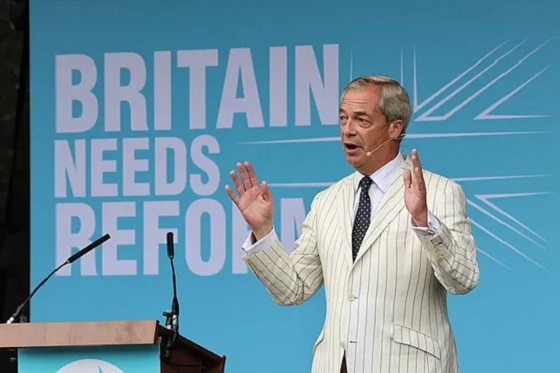
Quick Hit:
Reform UK has launched a DOGE-inspired audit to root out waste and overspending in councils it now controls. The party promises to save taxpayers money through aggressive forensic reviews and tech-driven accountability.
Key Details:
- Reform’s tech task force will audit spending across 10 local councils, beginning in Kent.
- The project is modeled on Elon Musk’s DOGE initiative, which Reform cites as saving $170 billion in the U.S.
- Local officials warn resistance to transparency will be treated as gross misconduct.
Diving Deeper:
Nigel Farage’s Reform UK has moved quickly to deliver on its pledge to clean up government waste by launching a sweeping audit of the 10 councils it won control of in May’s local elections. On Monday, the party deployed a team of data analysts, forensic auditors, and software engineers to begin a full investigation into spending practices—starting with the council in Kent.
The initiative is inspired by Trump’s Department of Government Efficiency, which officials say has saved American taxpayers over $170 billion. Reform’s British equivalent—also dubbed “DOGE”—will dig through financial records, contracts, audits, and whistleblower reports to identify waste and inefficiencies in local governance.
“For too long, British taxpayers have watched their money vanish into a black hole,” said Reform UK’s chairman in a statement to The Telegraph. “As promised, we have created a UK Doge to identify and cut wasteful spending of taxpayer money. Our team will use cutting-edge technology and deliver real value for voters.”
Linden Kemkaran, Reform’s new council leader in Kent, is leading the charge. In a letter to council CEO Amanda Beer, she demanded access to all financial records, including vendor agreements, audit issues from the last three years, and any relevant internal investigations. She warned that refusal to cooperate would trigger a formal council vote to compel compliance and could result in misconduct charges.
“This review is part of Reform’s commitment to transparency, accountability, the prudent management of public funds and the highest standards in public life,” said Kemkaran, who emphasized that scrutinizing council budgets was a cornerstone of the party’s local platform.
The move is also part of Farage’s national strategy. He’s pivoting Reform UK into a party for the working class—promising to scrap the two-child benefit cap, offer transferable tax breaks for married couples, and eliminate income tax for those earning under £20,000. To fund these proposals, Farage has pledged to dismantle what he calls “radical green Net Zero schemes,” slash diversity and asylum spending, and reduce the number of government quangos—measures he says could save £350 billion.
-

 Crime2 days ago
Crime2 days agoTerror in Boulder: Woman set on fire during pro-Israel hostage walk
-
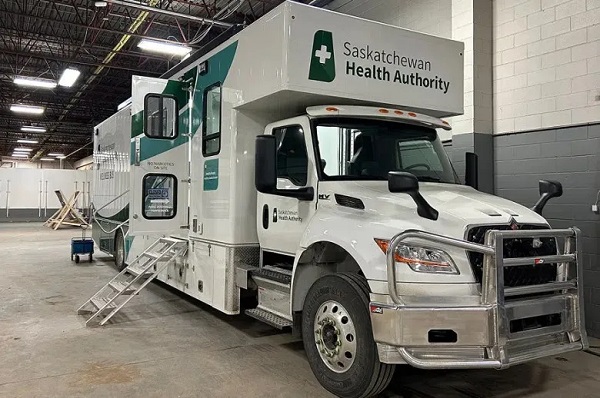
 Addictions2 days ago
Addictions2 days agoSaskatchewan launches small fleet of wellness buses to expand addictions care
-

 Business1 day ago
Business1 day agoOil producers brace for market share battle
-
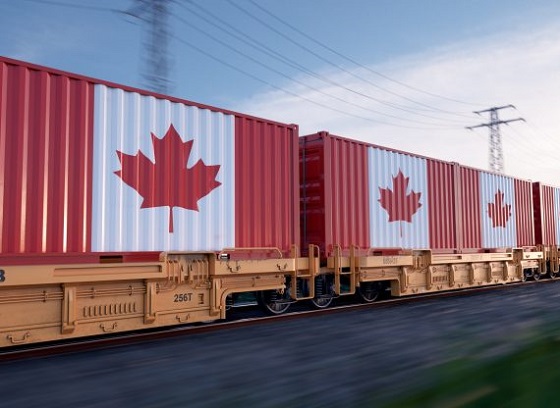
 Business2 days ago
Business2 days agoRemoving barriers to trade between Alberta and the rest of Canada could grow our economy by $72.1 billion, says the MEI
-

 Business14 hours ago
Business14 hours agoSobering reality check – Trump is right: Canada’s economy can’t survive a fair trade agreement with the US
-

 Bruce Dowbiggin2 days ago
Bruce Dowbiggin2 days agoNo Taxes, No Winter, No Worries: The Florida Formula For Winning?
-

 COVID-1924 hours ago
COVID-1924 hours agoCanada keeps COVID jab on immunization list for pregnant women after US halts recommendation
-
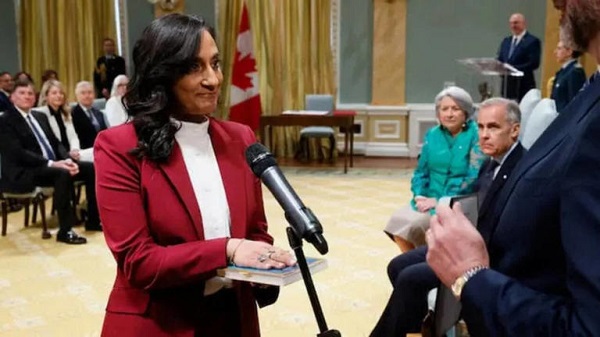
 Fraser Institute23 hours ago
Fraser Institute23 hours agoDeclining stature of foreign affairs minister underscores Canada’s waning influence on world stage





